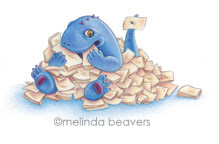Do you have any preference with working agented or unagented authors / illustrators, or does it all depend on the actual personalities involved?It's about the personalities, and the skill sets.
If you're the kind of person who has little hissy fits throughout the bookmaking process--hissy fits you feel you must share with your colleagues (as opposed to the more recommended sharing with your friends/family), you need an agent. Agents can offer you a sympathetic ear if your process involves venting before finding a way to compromise. Your publisher will get tired of you quickly if THEY have to babysit.
If you're the kind of person who is always, always behind deadline, you need an agent. An agent can keep reminding you, cajoling you, nagging you, whatever you need. Again, this is just part of some people's process. But your publisher doesn't have the time to do this, and so your book will be late, and the publisher will be unhappy.
If you're the kind of person who thinks you're just going to show the contract to your husband, who is a lawyer, you need an agent. There are as many different kinds of lawyers as there are doctors. Bringing a publishing contract to a tax or estate or criminal lawyer is akin to taking your foot problem to a cardiologist. YOU'RE GOING TO GET BAD ADVICE. The frustration this will cause your publisher is not worth it... to the publisher.
If you are the kind of person who doesn't know how to negotiate, and ends up agreeing to a crappy first offer, or alternatively thinks you're going to negotiate a $10,000 advance up to $100,000, you need an agent. An agent knows how to negotiate and what's reasonable to expect in the market.
If you want to be published at any of the houses that don't accept unagented submissions, or even at many of the ones that do, you need an agent. An agent knows not only the publishers, she knows the individual editors and which ones will respond best to your manuscript.
And let's not forget that if you want a guide through the booby-trapped and pathless jungles of a publishing career, you need an agent.
However, if you are an intrepid explorer yourself, of a patient and workmanlike nature; if you enjoy the research involved in plotting your own path through publishing, and are flexible about learning more as you go along, then you may not need an agent.



